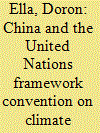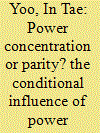|
|
|
Sort Order |
|
|
|
Items / Page
|
|
|
|
|
|
|
| Srl | Item |
| 1 |
ID:
153126


|
|
|
|
|
| Summary/Abstract |
This article examines how categorization mechanisms of the United Nations Framework Convention on Climate Change (UNFCCC) have affected the dynamics between China and other member states during the process of environmental negotiations, and how this categorized institutional environment influenced members’ bargaining positions during the studied period. It argues that by categorizing it as a non-Annex I Party, the UNFCCC conferred on China a context-specific role of a developing country and legitimized its reluctance to abide through legally binding commitments. Yet, as China’s capabilities changed, its institutional role as a developing country was perceived by other member states as inappropriate. Consequently, various member states, such as the United States and the European Union, expected China to enact the role of a rising power, which meant abiding by legally binding commitments and abandoning its current category group. Furthermore, during these negotiations, both China and other member states utilized the UNFCCC’s categorization mechanisms, by emphasizing institutional categorical positioning, in order to enhance their bargaining power. Therefore, this article illustrates how the parties to the Convention were able to reach a successful, binding, and inclusive agreement in Paris.
|
|
|
|
|
|
|
|
|
|
|
|
|
|
|
|
| 2 |
ID:
153127


|
|
|
|
|
| Summary/Abstract |
A large body of research suggests mass publics are capable of thinking coherently about international relations. We extend this body of research to show that domain relevant postures – in our case, more abstract beliefs about foreign policy – are related to how tough of a line representative samples of US and UK respondents want their governments to take toward China. More specifically, we utilize a unique comparative survey of American and British foreign policy attitudes to show broad support for toughness toward China. Beliefs about the use of the military and attitudes regarding globalization help explain preferences for tough economic and military policies toward China. In the two countries, the relationship between general foreign policy outlooks and the positions citizens take is robust to the addition of a general mediator that controls for the general affect those surveyed have toward China. Finally, the strength of the relationship between these abstract postures and specific preferences for a China policy are different across the countries.
|
|
|
|
|
|
|
|
|
|
|
|
|
|
|
|
| 3 |
ID:
153125


|
|
|
|
|
| Summary/Abstract |
Which condition between power concentration and power parity among regional countries is conducive to regional economic integration? The literature has suggested mixed findings as to the influence of power distribution. This study examines conditional effects of power distribution by identifying associated conditions to produce formal regional economic integration. Based on the comprehensive data on plurilateral trade agreements, this study employs both fuzzy set Qualitative Comparative Analysis (fsQCA) and process tracing techniques. The fsQCA reveals multiple jointly sufficient conditions to the outcome. In particular, I focus on two such conditions: (1) the presence of a regional hegemon with surrounding countries of homogeneous polity type and (2) the strong intraregional trade interdependence in conjunction with power parity among countries. These conditions are further supported in within-case analyses. These results indicate the conditional effect of power distribution and the existence of multiple paths toward regional economic integration.
|
|
|
|
|
|
|
|
|
|
|
|
|
|
|
|
| 4 |
ID:
153124


|
|
|
|
|
| Summary/Abstract |
We examine the influence of political economy reforms on the Trans-Pacific Partnership (TPP) negotiations using a two-level game analysis. Our main findings are summarized as follows. First, the political reforms implemented to strengthen executive policy making decrease the tariff rates in Japan and raise the possibility of the TPPãs conclusion. However, the influence on the political approval rating of the government depends on the content of such reforms. Second, agricultural policy reforms—from tariff protection to direct payments—decrease the tariff rates in Japan and raise the possibility of the TPP's conclusion. However, these reforms would decrease the political approval rating of the government. Third, a reduction in protectionist political pressure and an increase in direct payments would decrease the political approval rating of the government, because the ideal point of the agricultural ministry is proximate to that of the government representative (prime minister).
|
|
|
|
|
|
|
|
|
|
|
|
|
|
|
|
| 5 |
ID:
153128


|
|
|
|
|
| Summary/Abstract |
Existing literature contends that state capacity is an important variable that determines a country’s foreign policy behavior. Another strand of literature focuses on a more specific issue – the international relations of ethnic conflict, maintaining that domestic ethnic conflict may result in interstate conflict. In Southeast Asia, many weak states suffer from protracted ethnic conflict. However, few attempts have been made to assess the role of trans-border ethnic conflict in shaping interstate relations among the Association of South East Asian Nations (ASEAN) countries and the prospect of ASEAN security community. This article seeks to link the study of ASEAN with the issue of state capacity and internationalization of ethnic conflict. Deviating from existing literature, this article argues that the presence of trans-border ethnic groups in many ASEAN countries creates a common vulnerability, which in turn produces common interests and generates low levels of inter-state cooperation. Nevertheless, cross-border ethnic affiliations contribute to state leaders’ sense of insecurity and foment interstate mistrust. When the dynamics of ethnic politics in different countries interact, this interplay may add uncertainties to regional cooperation and inhibit the formation of a true security community. This article illustrates the above mechanism by examining the interaction between Malaysia and Thailand regarding the latter’s southern conflict.
|
|
|
|
|
|
|
|
|
|
|
|
|
|
|
|
|
|
|
|
|